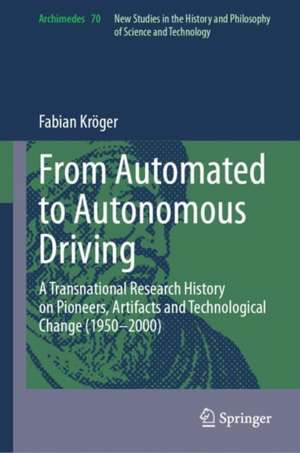From Automated to Autonomous Driving : A Transnational Research History on Pioneers, Artifacts and Technological Change (1950-2000): Archimedes, cartea 70
Autor Fabian Krögeren Limba Engleză Hardback – 2 apr 2024
Din seria Archimedes
- 5%
 Preț: 909.01 lei
Preț: 909.01 lei - 18%
 Preț: 899.21 lei
Preț: 899.21 lei - 18%
 Preț: 785.55 lei
Preț: 785.55 lei -
 Preț: 382.36 lei
Preț: 382.36 lei - 18%
 Preț: 1833.33 lei
Preț: 1833.33 lei - 15%
 Preț: 643.84 lei
Preț: 643.84 lei - 18%
 Preț: 951.77 lei
Preț: 951.77 lei - 15%
 Preț: 645.79 lei
Preț: 645.79 lei - 15%
 Preț: 644.30 lei
Preț: 644.30 lei - 20%
 Preț: 577.17 lei
Preț: 577.17 lei - 18%
 Preț: 1054.18 lei
Preț: 1054.18 lei - 15%
 Preț: 646.62 lei
Preț: 646.62 lei - 18%
 Preț: 1110.09 lei
Preț: 1110.09 lei - 18%
 Preț: 1211.25 lei
Preț: 1211.25 lei - 18%
 Preț: 730.02 lei
Preț: 730.02 lei - 18%
 Preț: 1546.82 lei
Preț: 1546.82 lei - 18%
 Preț: 891.48 lei
Preț: 891.48 lei - 18%
 Preț: 776.88 lei
Preț: 776.88 lei - 18%
 Preț: 1214.60 lei
Preț: 1214.60 lei - 18%
 Preț: 1113.26 lei
Preț: 1113.26 lei - 18%
 Preț: 777.69 lei
Preț: 777.69 lei - 18%
 Preț: 995.83 lei
Preț: 995.83 lei - 15%
 Preț: 635.47 lei
Preț: 635.47 lei - 24%
 Preț: 1459.25 lei
Preț: 1459.25 lei - 18%
 Preț: 948.47 lei
Preț: 948.47 lei - 18%
 Preț: 1666.97 lei
Preț: 1666.97 lei - 18%
 Preț: 1114.83 lei
Preț: 1114.83 lei - 15%
 Preț: 645.60 lei
Preț: 645.60 lei
Preț: 733.96 lei
Preț vechi: 895.07 lei
-18% Nou
Puncte Express: 1101
Preț estimativ în valută:
140.44€ • 146.63$ • 116.23£
140.44€ • 146.63$ • 116.23£
Carte tipărită la comandă
Livrare economică 05-19 aprilie
Preluare comenzi: 021 569.72.76
Specificații
ISBN-13: 9783031498800
ISBN-10: 3031498801
Ilustrații: XI, 307 p. 73 illus., 43 illus. in color.
Dimensiuni: 155 x 235 mm
Greutate: 0.63 kg
Ediția:2024
Editura: Springer Nature Switzerland
Colecția Springer
Seria Archimedes
Locul publicării:Cham, Switzerland
ISBN-10: 3031498801
Ilustrații: XI, 307 p. 73 illus., 43 illus. in color.
Dimensiuni: 155 x 235 mm
Greutate: 0.63 kg
Ediția:2024
Editura: Springer Nature Switzerland
Colecția Springer
Seria Archimedes
Locul publicării:Cham, Switzerland
Cuprins
Acknowledgements.- Chapter 1. Introduction.- Chapter 2. History of the research on vehicle automation in the United States.- Chapter 3. History of the research on vehicle automation in Japan.- Chapter 4. History of the research on vehicle automation in Europe.- Chapter 5. Findings of the inquiry.- Chapter 6. Timeline with firsts, milestones and shifts.- Index.
Notă biografică
Fabian Kröger is a cultural scientist and historian of technology, specialized in the field of mobility studies. His main research field is the cultural and technical history of the automobile. He published on the automobile in film, the imaginary of autonomous driving, the future of the automobile and the car as vision machine. His PhD-thesis focused on the relations between cultural images and scientific knowledge of car accidents in France and the United States. His articles had been published in German, English, French and Czech.
He was fellow of a project on autonomous driving funded by the Daimler and Benz Foundation. As assistant researcher at the media studies department of Paderborn University he supervised a journal issue on the gender dimension of autonomous driving. The imaginary of trains in cinema was another topic he explored for the French think-tank Forum Vie Mobiles in Paris. He is member of the French association P2M and of the Society of History of Technology in Germany. For seven years he was member of the Editorial board of Transfers – Interdisciplinary Journal of Mobility studies.
Funded by the University of Bundeswehr Munich, his current book is the first monograph on the research history of autonomous driving, covering five decades of research in the US, Japan and Europe. It gives insights into the long-term research efforts in the field of vehicle automation, mobile robots and artificial intelligence.
He was fellow of a project on autonomous driving funded by the Daimler and Benz Foundation. As assistant researcher at the media studies department of Paderborn University he supervised a journal issue on the gender dimension of autonomous driving. The imaginary of trains in cinema was another topic he explored for the French think-tank Forum Vie Mobiles in Paris. He is member of the French association P2M and of the Society of History of Technology in Germany. For seven years he was member of the Editorial board of Transfers – Interdisciplinary Journal of Mobility studies.
Funded by the University of Bundeswehr Munich, his current book is the first monograph on the research history of autonomous driving, covering five decades of research in the US, Japan and Europe. It gives insights into the long-term research efforts in the field of vehicle automation, mobile robots and artificial intelligence.
Textul de pe ultima copertă
This book presents the most important milestones of the research on automated and autonomous driving in the United States, Japan and Europe throughout five decades (1950-2000). Drawing on sources from the automotive industry, electrical engineering, the robotics and AI-domain and military institutions, it retraces the transition from the guidance-cable approach to vehicle-based sensor and vision systems. Giving a detailed overview of the technical concepts, artefacts, research vehicles and robots, the book presents the transnational engineering efforts that started long before Silicon Valley entered the field. In addition, the book also uniquely details the role of the military in the domain of vehicle automation. This all ensures the book is of great interest to historians of technology, practitioners in engineering disciplines, scholars working in mobility studies, journalists, and political decision makers
Caracteristici
Explains the difference between automated and autonomous driving Retraces the shift from infrastructure- to vehicle-based approaches Reveals that all thinking about the automobile must include the road
